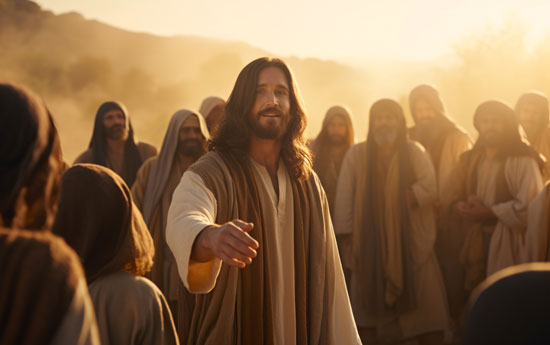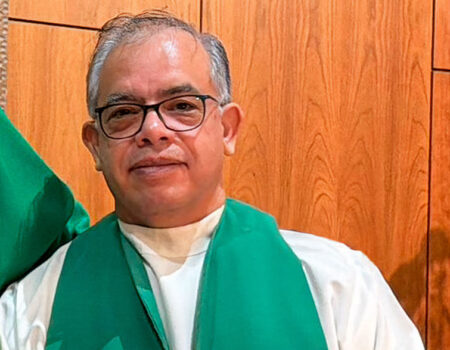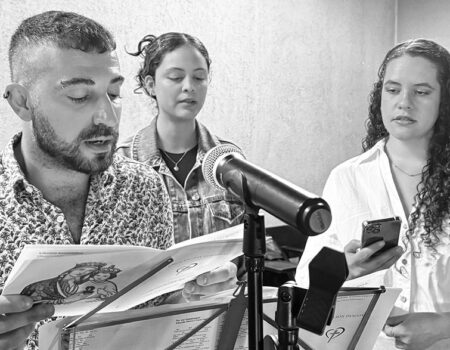Reflection: A path of conversion
Friday December 27, 2024

MSC Religious life.
Every year on 2 February, the Church celebrates the Day of Consecrated Life to pay tribute to those who have decided to dedicate their lives to God. Religious life is an integral part of the Church. It is characterised by commitments, public vows. In it, the place of prayer remains essential to live our vows well. Religious life is always at the service of God, being at the service of others. “Do this in remembrance of me” (1 Corinthians 11,20-26). The Eucharist we celebrate daily reminds us that the only power that Jesus Christ exercised as king is the strength of saving love, of the one who gives himself for the good of others. For the love of God and his people, religious life requires giving all one’s being to Christ and his Church. Religious life is based on the Gospel, the very life of Christ. To choose religious life is to want to live like Christ, to be in his wake. As the Second Vatican Council has pointed out:
“Indeed, through Baptism, a person dies to sin and is consecrated to God. However, in order that he may be capable of deriving more abundant fruit from this baptismal grace, he intends, by the profession of the evangelical counsels in the Church, to free himself from those obstacles, which might draw him away from the fervor of charity and the perfection of divine worship. By his profession of the evangelical counsels, then, he is more intimately consecrated to divine service” (Lumen Gentium, 44).
“Hence it follows that the profession of the evangelical vows is a super-addition to that consecration which is proper to Baptism. It is indeed a special consecration which perfects the former one, inasmuch as by it, the follower of Christ totally commits and dedicates himself to God, thereby making his entire life a service to God alone” [Message of Pope Paul VI to the General Chapters or Religious Orders and Congregations, 23 May 1964]
Vows are commitments made in public. To maintain a closer relationship with Christ, we adapt our lives by following his example. His life was characterised by many characteristics, but three of them were essential:
· In all circumstances, Jesus submitted to his Heavenly Father: “My food is to do the will of the one who sent me and to finish his work” (Jn 4,34)
· He lived the chastity of a single person and spoke of celibacy: “some, because they have renounced marriage for the sake of the kingdom of heaven” (Mat 19,12).
· He lived without anything: “For you know the gracious act of our Lord Jesus Christ, that for your sake he became poor although he was rich, so that by his poverty you might become rich” (2 Cor 8,9).
As MSC, we make three vows: obedience, chastity and poverty. We commit ourselves to imitating Jesus in this way throughout our lives.
Obedience. Obedience is given priority among the evangelical counsels. It is lived in fraternal charity. By obedience, “we bind ourselves to live and act always within that communion and to practice obedience in mutual charity” (CS 42). Chevalier wrote in 1869: “Those who enter our Society can readily accept that others may surpass them in learning, in mortification, in poverty; but they will not allow themselves to be outdone in obedience and mutual charity.” According to our constitutions, “by professing obedience, we commit ourselves to seek and accept the will of God in the life and mission of the Society” (CS 41).
If we think about it, obedience is a gift of love from ourselves to God, and we entrust ourselves to him through the Congregation and our legitimate superiors. By giving ourselves totally, we conform to the word of Jesus, who said: “My food is to do the will of the one who sent me and to finish his work” (Jn 4,34). As baptised children of God, we are free to give ourselves like this and to make a vow of obedience, which is a testimony of our freedom.
This belonging to mutual obedience is marked by a tension between two characteristics: a gift of oneself without reserve to the Congregation and a search for consensus based on mutual respect (CS 58 S). To preach the freedom of Christ, it is indispensable to have both, for this is the freedom that the world seeks. Consequently, obedience practised in charity favours voluntary service rather than servile submission.
“In professing obedience, religious offer the full surrender of their own will as a sacrifice of themselves to God and so are united permanently and securely to God’s salvific will. After the example of Jesus Christ, who came to do the will of the Father (cf. John 4:34; 5:30; Heb. 10:7; Ps. 39:9) and “assuming the nature of a slave” (Phil. 2:7) learned obedience in the school of suffering (cf.Heb. 5:8), religious under the motion of the Holy Spirit, subject themselves in faith to their superiors who hold the place of God. Under their guidance, they are led to serve all their brothers in Christ, just as Christ himself, in obedience to the Father, served His brethren and laid down His life as a ransom for many (cf. Matt. 20:28; John 10:14-18). So they are closely bound to the service of the Church and strive to attain the measure of the full manhood of Christ (Eph. 4:13)” (Perfectae Caritatis, 14).
By the vow of obedience, we make decisions in accordance with the will of God, which is often mediated for them by the authority of our congregation.
Chastity. Chastity « for the sake of the kingdom of heaven» (Mt 19,12), which we profess, must be regarded as a distinguished gift of grace. Chastity is living with an undivided heart. Chastity testifies to a deep love, which is friendship, and as consecrated men, we show the only mystery of love differently, and thus, we witness to God who is love. Hence, the first sin against chastity is failure to love because chastity is always based on love; it can never be based on fear of our sexuality or our corporeality or others. As Saint John says: “There is no fear in love, but perfect love drives out fear because fear has to do with punishment, and so one who fears is not yet perfect in love” (1 Jn 4,18). This self-giving to God and the neighbour is not easy. It requires fraternal support. That is why we say at mass in the I confess to God, “I ask […] you, my brothers and sisters, to pray for me to the Lord our God. » We must not rely on our strength, but on God, through penance, mortification, and fraternal loving support. As consecrated men, can we say that we find joy, happiness, friendship, laughter, spontaneity, and a way of loving that is extraordinary in our religious life?

“The chastity “for the sake of the kingdom of heaven” (Matt. 19:12), which religious profess should be counted as an outstanding gift of grace. It frees the heart of man in a unique fashion (cf. 1 Cor. 7:32-35) so that it may be more inflamed with love for God and for all men. Thus, it not only symbolises the heavenly goods but also the most suitable means by which religious dedicate themselves with undivided hearts to the service of God and the works of the apostolate. In this way, they recall to the minds of all the faithful that wondrous marriage decreed by God and which is to be fully revealed in the future age in which the Church takes Christ as its only spouse” (Perfectae Caritatis, 12).
By the vow of chastity, MSCs give themselves to God in love so fully that the pursuit of union with God is the driving force of their lives. Our hearts are free to love God above all else and to love all people for the sake of God. Celibacy is adopted not because marriage is not desired but because union with God and the work of God are more greatly desired.
“All men should note that the profession of the evangelical counsels, though entailing the renunciation of certain values which are to be undoubtedly esteemed, does not detract from a genuine development of the human persons, but rather by its very nature is most beneficial to that development. Indeed, the counsels, voluntarily undertaken according to each one’s personal vocation, contribute a great deal to the purification of the heart and spiritual liberty. They continually stir up the fervour of charity. But especially, they can more fully mould the Christian man to that type of chaste and detached life, which Christ the Lord chose for Himself and which His Mother also embraced. This is clearly proven by the example of so many holy founders. Let no one think that religious have become strangers to their fellowmen or useless citizens of this earthly city by their consecration. For even though it sometimes happens that religious do not directly mingle with their contemporaries, yet in a more profound sense these same religious are united with them in the heart of Christ and spiritually cooperate with them. In this way the building up of the earthly city may have its foundation in the Lord and may tend toward Him, lest perhaps those who build this city shall have labored in vain” (Lumen Gentium, 46).
Poverty. Poverty is more culturally determined than the other two vows. By our profession, we promise to God that we do not possess anything by right of personal property but keep all things in common and use them under the direction of superiors for the common good of the Congregation. Following the apostles’ example, we “distributed to each according to need” [Acts 4,35] and the common good. Our voluntary poverty is not a deprivation as such, although it implies a certain solidarity with the poor of the world, and we are called to live frugal and simple lives in order to be able to put our treasure in the kingdom of the justice of God, and trust in His providence. Poverty gives us the freedom to be called at any moment so that everywhere the love of God is manifested. We cannot be missionaries if we have to carry all our furniture and personal belongings every time we go on mission. “As you go, make this proclamation: ‘The kingdom of heaven is at hand.’ […] Do not take gold or silver or copper for your belts; no sack for the journey, or a second tunic, or sandals, or walking stick” [Mt 10,7-10].
“Religious should diligently practice and if need be express also in new forms that voluntary poverty which is recognised and highly esteemed especially today as an expression of the following of Christ. By it, they share in the poverty of Christ who for our sakes became poor, even though He was rich, so that by His poverty we might become rich (cf. 2 Cor. 8:9; Matt. 8:20). With regard to religious poverty, it is not enough to use goods in a way subject to the superior’s will, but members must be poor both in fact and in spirit, their treasures being in heaven (Matt. 8:20)” (Perfectae Caritas, 13).
By the vow of poverty, we possess everything in common, share our goods and are invited to live simply, both personally and communally, taking into account the circumstances of time and place (CS 50). That each of us, in his task, may feel bound to the common law of labour and while thus procuring for himself the necessary for our maintenance and works, reject any excessive concern and entrust himself to the providence of the Father of heaven (Matt. 6,25).
When we profess our vow of poverty publicly, we accept to live in the discomfort of the gospel. Living this discomfort is a way of being prophetic in a society that values having it at the expense of being, property and self-sufficiency. Our vow of poverty makes us free in regard to goods. It is not a question of deprivation, but rather of the relationship we have with food, money, comfort, material things, even our own will.
Our vow of poverty is a form of abandonment to God, a way of recognising that everything comes from Him. This is what our constitutions say in number 48: “Jesus lived in total dependence on his Father, putting himself completely into his hands. He calls us to live in the same way in union with him by choosing evangelical poverty in answer to his call.” How can we be close to the poor and excluded, working in the field of justice, peace and integration of creation if we are not detached from created things? How to live differently our solidarity with the poor and the little ones?
This vow calls us to be accountable and responsible. “All who believed were together and had all things in common; they would sell their property and possessions and divide them among all according to each one’s need” (Acts 2,44). And “there was no needy person among them” (Acts 4,34). The well-being of our members, our works and our missions is only sustainable if we all contribute to the common fund.
Chevalier wrote in 1855: “Gentleness, humility, obedience, a spirit of poverty, of zeal, of sacrifice, of devotedness will be their lot.”
“The one who peers into the perfect law of freedom and perseveres, and is not a hearer who forgets but a doer who acts, such a one shall be blessed in what he does” (James 1,25).
May we show the world our happiness in fulfilling our vows as consecrated men following Jules Chevalier’s footsteps. May we exercise the only power we have, the strength of a saving love, of one who gives himself for the good of others. Let us do this in memory of Christ, who gave his life to save the world.
Lord, you who exercise the unique power of love as a gift of life help our community to love. Amen!
Bernard Mongeau, msc





